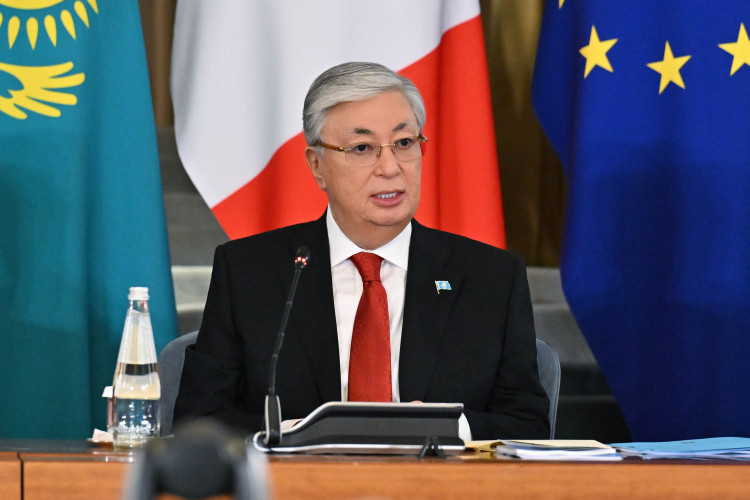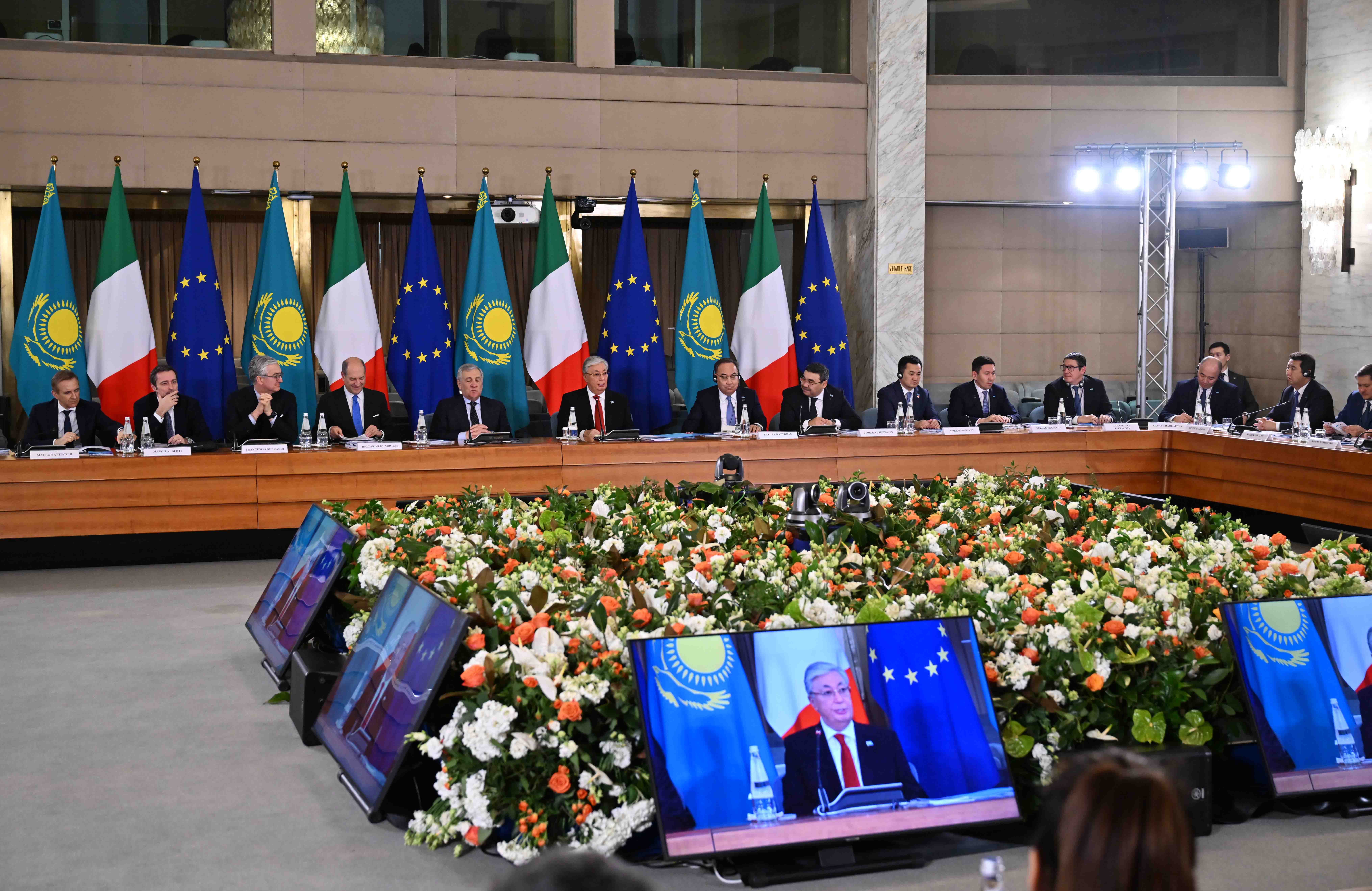ASTANA – President Kassym-Jomart Tokayev addressed Italian business people at the Kazakh-Italian roundtable in Rome on Jan. 18, witnessing the signing of four strategic documents, reported the Akorda press service.

President Tokayev addressed Italian business people at the Kazakh-Italian roundtable in Rome on Jan. 19. Photo credit: Akorda.
The roundtable gathered top management from nearly 30 Italian companies.
Kazakhstan’s Samruk Kazyna Sovereign Wealth Fund and Balestra signed an agreement defining the terms of the implementation of a project to build a sulfuric acid plant in the Suzak district in the Turkistan Region. The capacity of the plant, which will supply sulfuric acid to the companies of the Kazatomprom national company, will be 800,000 tons per year.
Kazakhstan’s Baiterek holding signed an agreement with SACE, an Italian insurance-financial group, establishing a limit on insurance for transactions with Italian participation in investment projects in priority sectors of the economy.
The roundtable saw the signing of an agreement between Samruk Energy and Ansaldo Energia. The agreement envisions the reconstruction of Almaty’s combined heat and power plant (CHP-3) with the construction of a steam-gas unit with a capacity of up to 544 megawatts.
Another document was a memorandum of cooperation between the Atameken National Chamber of Entrepreneurs and the General Confederation of Italian Industry, commonly known as Confindustria, the Italian small, medium, and big enterprises federation.
The document is aimed at supporting Italian companies in Kazakhstan and Kazakhstan’s companies in Italy, as well as strengthening economic and trade relations between the business communities of Kazakhstan and Italy. There are now approximately 300 companies in Kazakhstan with Italian capital.
Economic growth in Kazakhstan
During the roundtable, President Tokayev, who arrived for an official visit in Rome on the evening of Jan. 17, extensively discussed the investment opportunities in Kazakhstan. He asserted that despite the geopolitical developments, the nation maintains its position as the largest and one of the fastest-growing economies in the region.

Photo credit: Akorda.
He pointed out the country’s economic growth last year was at 5.1%, nearly twice the projected global indicator.
“In the medium term, we set ourselves the strategic goal of achieving growth in the range of 6-7%, which will allow us to double the size of the economy by 2029. This requires comprehensive reforms,” said the Kazakh leader.
He told the Italian business community that besides political reforms, Kazakhstan is also committed to strengthening its market-oriented and competitive economy, which he deemed a “necessary condition for success.”
“Today, I can confidently inform you that significant and fundamental reforms will soon begin in Kazakhstan, making our economy more transparent, resilient, and dynamic. Our goal is to bring Kazakhstan’s standards, rules, and business practices to the level of the Organisation for Economic Co-operation and Development. We aim to create an investment climate that meets the highest global standards,” said Tokayev.
He assured the investors of the nation’s plan to continue implementing measures to make investing in Kazakhstan more attractive, including eliminating unnecessary requirements for businesses.
“The Investment Council has recently been established, endowed with extensive powers that will facilitate the implementation of investment projects through prompt decision-making and comprehensive government support,” added Tokayev.
Antonio Tajani, Italian Minister of Foreign Affairs and International Cooperation, expressed Italy’s keen interest in increasing exports and providing new opportunities for Italian businesses.
“Kazakhstan is a priority country for our diplomacy of growth,” he wrote in a post on X.
Oil and gas sector
According to Tokayev, the energy sector is the primary area of economic cooperation between Kazakhstan and Italy. More than 80% of Kazakhstan’s oil is exported to Europe, meeting around 10% of the European Union’s needs.
“I want to express gratitude to Italy, a long-standing and reliable energy partner of Kazakhstan,” said Tokayev, commending Eni’s activities in Kazakhstan, including in the nation’s giant Kashagan and Karachagan fields.
Eni is an Italian multinational energy company engaged in the exploration, production, refining, and marketing of oil and natural gas. It is one of the world’s major integrated energy companies, with operations in more than 60 countries across the globe.
Tokayev invited Italian companies to participate in the service maintenance of the oil and gas industry.
Renewable energy and critical raw minerals
Another area of cooperation that offers significant opportunities is renewable energy. The President emphasized that Kazakhstan became the first country in the region to ratify the Paris Agreement and undertake commitments to achieve carbon neutrality by 2060.
The renewable energy potential of Kazakhstan, he noted, is estimated at one trillion kilowatts per hour.
“It has attracted the interest of major global companies such as the French Total, Saudi ACWA Power, UAE’s Masdar, and the German-Swedish Svevind Energy Group. These companies intend to implement projects to generate 43 gigawatts of renewable energy,” said Tokayev.
He is confident Italian companies can also join these companies in uncovering Kazakhstan’s renewable energy potential.
Tokayev also called on Italian businesses to collaborate in the extraction and processing of critical raw materials, another strategically important area given the technological revolution and the projected growth in global demand.
“According to the World Bank’s estimates, Kazakhstan has over 5,000 undiscovered deposits valued at over $46 trillion. Today, we already produce 19 out of the 34 types of raw materials needed for the European Union’s economy,” said Tokayev.
The deposits of another nine types of minerals, including cobalt, tungsten and lithium, can be developed with the necessary investments, he added.
The International Energy Agency estimates demand will continue to grow and will more than double by 2030. Globally, investment in critical minerals development rose by 20% in 2021 and 30% in 2022. Among the different minerals, lithium saw the biggest increase in investment, at 50%.
Transport and logistics
In its effort to become a regional hub, Kazakhstan is keen to develop the Trans-Caspian International Transport Route, also known as the Middle Corridor. Data from the Kazakh Transport Ministry shows in 2023, nearly 2.75 million tons of cargo were transported via the TITR, which is 64% more than in 2022.
The transit time along the TITR was reduced from 38-53 days to 18–23 days. It is planned to reduce this period to 14–18 days in 2024, including within the territory of Kazakhstan – from 6 to 5 days.
Tokayev said the route complements the Belt and Road Initiative. He also said Kazakhstan plans to connect the route with the Trans-European Transport Network, an EU-wide network of rail, inland waterways, short-sea shipping routes, and roads, and the Global Gateway.
“We also support the G7 initiative for partnership in global infrastructure and investments,” added Tokayev.
Over the past 15 years, Kazakhstan has invested over $35 billion in transportation infrastructure. In the next three years, the country plans to build over 1,300 kilometers of railways.
“This will increase the transportation of goods towards China, South Asia, and Europe. Therefore, we invite Italian investors to participate in the development of our ports, joint production of transport vessels, and the creation of logistics centers,” he said.
Tokayev stressed Kazakhstan and Italy are “more connected than ever before” with 13 international routes passing through Kazakhstan and direct flights between Almaty and Milan.
“We welcome plans to establish direct air links between Astana and Rome and Milan. This will undoubtedly contribute to the development of our economic relations and people-to-people ties, as well as promote tourism,” said Tokayev.
Agroindustry
Ample opportunities are also present in the agricultural sector, according to the Kazakh President. He mentioned Kazakhstan’s abundant resources as more than 70% of its territory is suitable for agriculture, making the country the “breadbasket of Central Asia.”
“We are among the top ten largest global producers of wheat and flour. Our agricultural products are supplied to more than 80 countries worldwide. Considering the growing food shortage globally, we aim to triple the productivity of this sector and double our exports. Kazakhstan is interested in developing cooperation with Italian partners in the cultivation of cereals and oilseeds, as well as the production of pasta, meat, and dairy products,” noted the President.

